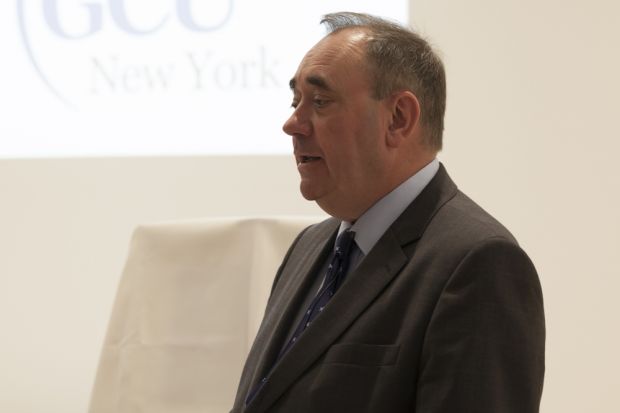The Scottish First Minister telephoned Louise Richardson after she gave an interview with the Times in March, in which she warned that “if we were cut off from national research councils it would be catastrophic for this institution”.
According to the Daily Telegraph, a source said the conversation between Mr Salmond and Professor Richardson was “loud and heated”.
The paper has also obtained emails which show how Mr Salmond, a St Andrews graduate, asked Professor Richardson to “clarify” her comments about independence.
Salmond’s chief of staff, Geoff Aberdein, contacted the principal’s office to suggest a statement that Professor Richardson release under her name.
That statement praised the Scottish Government for having “risen to the challenge” over tuition fees and expressed confidence that it could protect research funding after independence, while criticising the UK government, according to documents seen by the paper.
Professor Richardson sent an email to her press team saying: “I’m sorry but I’m afraid I cannot agree to this statement.”
The emails, obtained by the Daily Telegraph using the Freedom of Information Act, are the first documents to show that the Scottish First Minister has put pressure on high-profile individuals to influence what they say about the independence question, the newspaper says.
The correspondence showed the Scottish National Party had “abused its power” to intimidate senior figures to stay quiet about independence, a Scottish Labour spokesman claimed.
“The dogs in the street know that the SNP has used the power of the Scottish Government to bully and intimidate anyone who doesn’t agree with them,” he said.
“What has been happening secretly as the First Minister and his advisers bully and intimidate, we now see on the streets as the Yes campaign tries to bully Scotland into submission.”
A spokesman for Mr Salmond said the First Minister “hugely values Louise Richardson’s input on a whole range of issues, including as a member of his council of economic advisers, and the contact with the university in this case was part of that routine dialogue.”
He added: “Mr Aberdein was simply doing his job, and the discussions with counterparts at the university were cordial, as the email exchanges show.”
Register to continue
Why register?
- Registration is free and only takes a moment
- Once registered, you can read 3 articles a month
- Sign up for our newsletter
Subscribe
Or subscribe for unlimited access to:
- Unlimited access to news, views, insights & reviews
- Digital editions
- Digital access to THE’s university and college rankings analysis
Already registered or a current subscriber? Login




